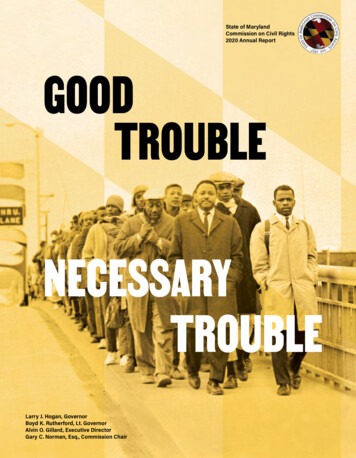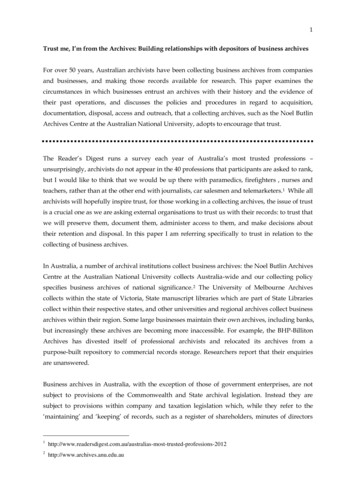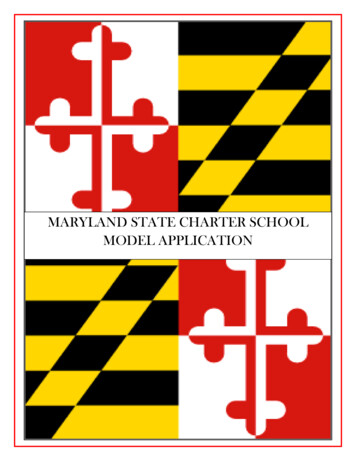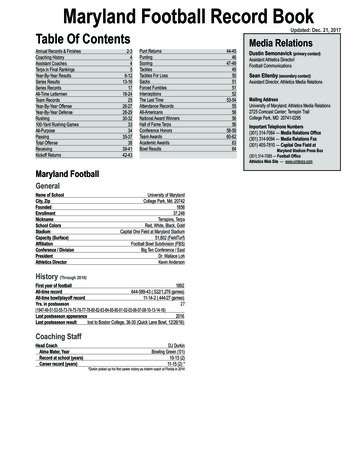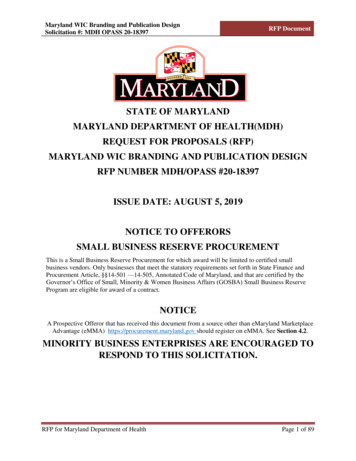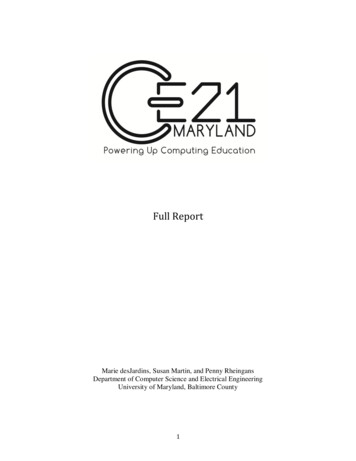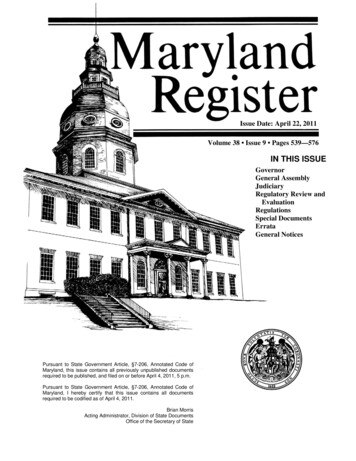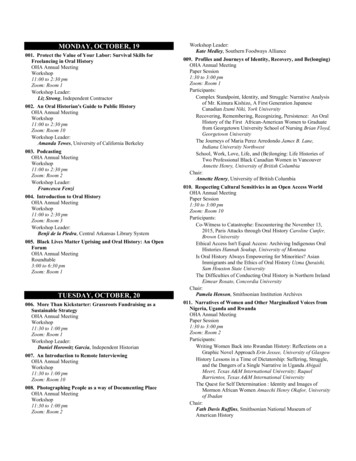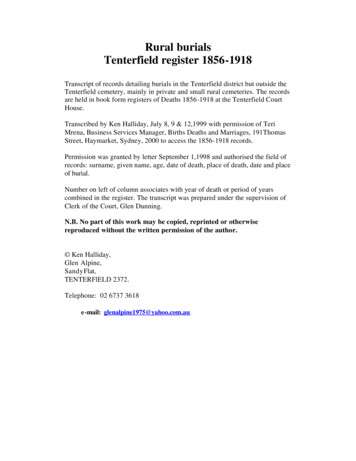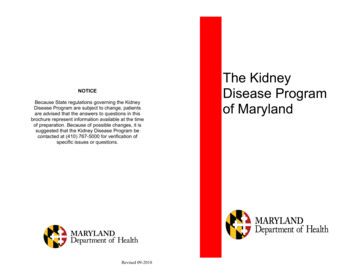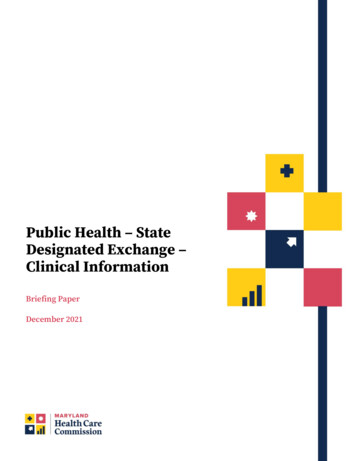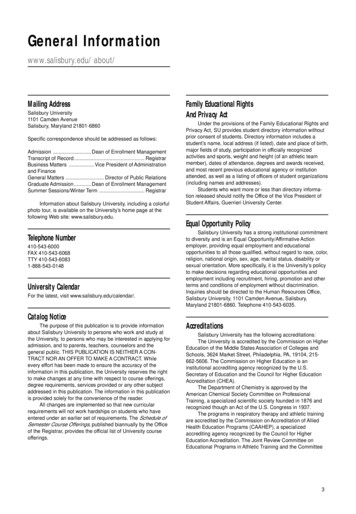
Transcription
General Informationwww.salisbury.edu/about/Mailing AddressSalisbury University1101 Camden AvenueSalisbury, Maryland 21801-6860Specific correspondence should be addressed as follows:Admission . Dean of Enrollment ManagementTranscript of Record . RegistrarBusiness Matters . Vice President of Administrationand FinanceGeneral Matters . Director of Public RelationsGraduate Admission . Dean of Enrollment ManagementSummer Sessions/Winter Term . RegistrarInformation about Salisbury University, including a colorfulphoto tour, is available on the University’s home page at thefollowing Web site: www.salisbury.edu.Telephone Number410-543-6000FAX 410-543-6068TTY 410-543-60831-888-543-0148University CalendarFor the latest, visit www.salisbury.edu/calendar/.Catalog NoticeThe purpose of this publication is to provide informationabout Salisbury University to persons who work and study atthe University, to persons who may be interested in applying foradmission, and to parents, teachers, counselors and thegeneral public. THIS PUBLICATION IS NEITHER A CONTRACT NOR AN OFFER TO MAKE A CONTRACT. Whileevery effort has been made to ensure the accuracy of theinformation in this publication, the University reserves the rightto make changes at any time with respect to course offerings,degree requirements, services provided or any other subjectaddressed in this publication. The information in this publicationis provided solely for the convenience of the reader.All changes are implemented so that new curricularrequirements will not work hardships on students who haveentered under an earlier set of requirements. The Schedule ofSemester Course Offerings, published biannually by the Officeof the Registrar, provides the official list of University courseofferings.Family Educational RightsAnd Privacy ActUnder the provisions of the Family Educational Rights andPrivacy Act, SU provides student directory information withoutprior consent of students. Directory information includes astudent’s name, local address (if listed), date and place of birth,major fields of study, participation in officially recognizedactivities and sports, weight and height (of an athletic teammember), dates of attendance, degrees and awards received,and most recent previous educational agency or institutionattended, as well as a listing of officers of student organizations(including names and addresses).Students who want more or less than directory information released should notify the Office of the Vice President ofStudent Affairs, Guerrieri University Center.Equal Opportunity PolicySalisbury University has a strong institutional commitmentto diversity and is an Equal Opportunity/Affirmative Actionemployer, providing equal employment and educationalopportunities to all those qualified, without regard to race, color,religion, national origin, sex, age, marital status, disability orsexual orientation. More specifically, it is the University’s policyto make decisions regarding educational opportunities andemployment including recruitment, hiring, promotion and otherterms and conditions of employment without discrimination.Inquiries should be directed to the Human Resources Office,Salisbury University, 1101 Camden Avenue, Salisbury,Maryland 21801-6860. Telephone 410-543-6035.AccreditationsSalisbury University has the following accreditations:The University is accredited by the Commission on HigherEducation of the Middle States Association of Colleges andSchools, 3624 Market Street, Philadelphia, PA, 19104, 215662-5606. The Commission on Higher Education is aninstitutional accrediting agency recognized by the U.S.Secretary of Education and the Council for Higher EducationAccreditation (CHEA).The Department of Chemistry is approved by theAmerican Chemical Society Committee on ProfessionalTraining, a specialized scientific society founded in 1876 andrecognized though an Act of the U.S. Congress in 1937.The programs in respiratory therapy and athletic trainingare accredited by the Commission on Accreditation of AlliedHealth Education Programs (CAAHEP), a specializedaccrediting agency recognized by the Council for HigherEducation Accreditation. The Joint Review Committee onEducational Programs in Athletic Training and the Committee3
General Informationon Accreditation for Respiratory Care serve as arms of theCAAHEP and review all programs seeking specializedaccreditation status in athletic training or respiratory therapy,respectively.The social work program is accredited by the Council onSocial Work Education, a specialized accrediting agencyrecognized by the Council for Higher Education Accreditation.The degree programs in business are accredited by theAssociation to Advance Collegiate Schools of Business, aspecialized accrediting agency.The program in medical technology is accredited by theNational Accrediting Agency for Clinical Laboratory Sciences,8410 W. Bryn Mawr Ave., Suite 670, Chicago, IL 60631, (773)714-8880. The NAACLS is a specialized accrediting agencyrecognized by the Council for Higher Education Accreditation.The program in environmental health sciences isaccredited by the National Environmental Health Science andProtection Accreditation Council, 720 S. Colorado Blvd., SouthTower, Suite 970, Denver, CO 80246, (303) 756-9090. TheNEHSPAC is a specialized accrediting agency recognized bythe Council for Higher Education Accreditation.The programs in nursing are accredited by the NationalLeague for Nursing Accrediting Commission, 61 Broadway,33rd Floor, New York, NY 10006, (212) 363-5555. The NLNACis a specialized accrediting agency recognized by the Councilfor Higher Education Accreditation.The programs in teacher education are accredited by theNational Council for Accreditation of Teacher Education(NCATE), 2010 Massachusetts Avenue, NW, Suite 500,Washington, D.C. 20036, (202) 466-7496. The NCATE is aspecialized accrediting agency recognized by the U.S.Secretary of Education and the Council for Higher EducationAccreditation.DesignationsSalisbury University has the following designations:Maryland State Publications DepositoryServiceman’s Opportunity CollegeU.S. Government Selective Document DepositoryAmerican Association of Botanical Gardens and Arboreta4MembershipsSalisbury University is a member of the followingorganizations:American Association of Colleges of NursingAmerican Association of Colleges for Teacher EducationAmerican Association of State Colleges & UniversitiesAmerican Council on EducationAssociation of American Colleges & UniversitiesCollege BoardCouncil on Social Work EducationEDUCAUSENational Collegiate Athletics AssociationNorth Eastern Association of Graduate SchoolsUniversity System of MarylandSalisbury University is a member of the University Systemof Maryland, which is comprised of 11 campuses, about 70centers and institutes, and three other research and publicservice institutes.
The UniversityThe Universitywww.salisbury.edu/about/Dr. Janet Dudley-Eshbach, PresidentMISSIONSalisbury University’s mission is to cultivate and sustain asuperior, student-centered learning community where students,faculty and staff are viewed as both teachers and learners, andwhere a commitment to excellence permeates all aspects ofUniversity life. We recruit exceptional and diverse faculty, staff,undergraduate and graduate students and support them asthey work together to reach the University’s goals. ServingMaryland and the Mid-Atlantic region, we are concernedparticipants in responding to the educational, economic,cultural and social needs of our community and believe thatservice is a vital component of civic life. Our highest purpose isto empower our students with the knowledge, skills and corevalues that contribute to lifelong learning and active citizenshipin a democratic society and interdependent world.VALUESThe core values of Salisbury University are excellence,student-centeredness, learning, community, civic engagementand diversity. We believe these values must be lived andexperienced as integral to everyday campus life so thatstudents make the connection between what they learn andhow they live.Excellence: Excellence, the standard against which allUniversity activities and outcomes are measured, connotes theperfection and the quality for which we strive and holdourselves accountable. We accept the notion that the quality ofa university depends on the heads and hearts of those in it.Student-Centeredness: Our students are the primaryreason for our existence. Our focus is on their academic andindividual success and on their health and well-being. We arecommitted to helping students learn to make reasoneddecisions and to be accountable for the outcomes of thedecisions they have made.Learning: We believe that learning is fundamental toliving a life with purpose in an increasingly interrelated worldand that our role is to teach students not what to think, but howto think. The University introduces students to a system ofideas about the nature of humanity, the universe, and the worldcreated by art and thought. Through active learning, servicelearning, international experience and co-curricular activities,students connect research to practice, and theory to action.Community: Salisbury University takes pride in being acaring and civil place where individuals accept their obligationsto the group, learn through their interactions and relationshipswith others, where governance is shared, and where the focusis on the common good. We honor the heritage and traditionsof the institution which serve as a foundation for future change.6Civic Engagement: The University stands as a part of,rather than apart from, the local and regional community.Recognizing its history and traditions, we seek to improve thequality of life for citizens in the region. We believe it is ourresponsibility to enrich cultural life, enhance the conduct ofpublic affairs and contribute to the advancement of the region.We seek to instill in our students a lifelong commitment to civicengagement.Diversity: Salisbury University views itself as a justcommunity where there is respect for the value of global,societal and individual differences and commitment to equalopportunity. Diversity is purposefully cultivated as a way tostrengthen and enhance our University community.HISTORYIn 1922, the Maryland Legislature established a commission to determine a location for a two-year college on thestate’s Eastern Shore. A site at Salisbury was selected and theinstitution opened in September 1925.The college’s two-year course of study was increased tothree years in 1931 and to four years in 1934. Following this,and by action of the Legislature of 1935, the College wasauthorized to grant the Bachelor of Science.The academic program expanded in 1947 and in 1960,offering four-year programs in arts and sciences and providingstudents with a Bachelor of Arts or Bachelor of Science. TheUniversity continues to meet the increasing demands of societyfor quality education and today offers a variety of undergraduate programs in liberal arts, sciences and in the professionalfields of business administration, education, medical technology, nursing, respiratory therapy and social work.In 1962, the State Board of Trustees approved a graduateprogram leading to the Master of Education, followed with aMaster of Arts in English (1974), a Master of BusinessAdministration (1981), a Master of Science with a major innursing (1982). The Board of Regents for the UniversitySystem of Maryland has subsequently approved a Master ofEducation with a major in public school administration (1994), aMaster of Arts in Teaching (1996), a Master of Arts with a majorin history (1998), a Master of Science in Applied HealthPhysiology (2000), and a Master of Social Work (2001).Today, Salisbury University is a nationally accredited, fouryear comprehensive university offering 45 distinct undergraduate and graduate degree programs in a friendly atmospherethat encourages close relationships between faculty andstudents.
The UniversityLOCATIONSalisbury University is located on U.S. Route 13 at thesouthern edge of Salisbury, MD, which has a metropolitanpopulation of 70,000 and lies 30 miles west of Ocean City, MD;115 miles southeast of Baltimore, MD, and Washington, D.C.;125 miles south of Philadelphia, PA; and 125 miles north ofNorfolk, VA.ORGANIZATIONResponsibility for the administration of the University isassigned to the president, who is appointed by the UniversitySystem of Maryland Board of Regents. The president isassisted in the administration of the University by academic,advancement, student services and business administrators.Appointments to these positions, to other administrative officesand to the faculty and staff of the University are made by thepresident.The Franklin P. Perdue School of Business, the SamuelW. and Marilyn C. Seidel School of Education and ProfessionalStudies, the Charles R. and Martha N. Fulton School of LiberalArts and the Richard A. Henson School of Science andTechnology offer the University’s curriculum. School deans,department heads and individual faculty members report to theprovost in all matters pertaining to instruction.The Franklin P. Perdue School of Business includes thefaculties of accounting, business administration, economicsand management information systems.The Samuel W. and Marilyn C. Seidel School of Education and Professional Studies includes the faculties of athletictraining, early childhood education, elementary education,health education, physical education and social work.The Charles R. and Martha N. Fulton School of LiberalArts includes the faculties of art, communication arts, conflictanalysis and dispute resolution, English, history, interdisciplinary studies, modern languages (French, German, Spanish),music, philosophy, political science, psychology, sociology andtheatre.The Richard A. Henson School of Science and Technology includes the faculties of biology, chemistry, environmentalhealth, geography and geosciences, mathematical andcomputer sciences, medical technology, nursing, physics andrespiratory therapy.CENTERS AND INSTITUTESBusiness, Economic and Community OutreachNetwork (BEACON)The Business, Economic and Community OutreachNetwork (BEACON) of the Franklin P. Perdue School ofBusiness offers research and consulting services to a variety ofclients, including private businesses, government agencies,nonprofit and community organizations. BEACON providesthese services in a student-based learning environment,providing real world experience under the careful supervision offaculty mentors. BEACON’s focus is on delivering innovativesolutions to clients while helping students apply what they learnin the classroom.BEACON’s subunits and programs include: The Project Management Group, providing planning,development and implementation services to campus andexternal organizations interested in undertaking large-scalebusiness, economic and community projects with complexscope-of-work requirements. Bienvenidos â Delmarva, providing technical, managerialand promotional assistance to private sector, government andcommunity-based organizations delivering services to ourregion’s rapidly growing Hispanic, Latino and immigrantpopulations. The Regional Information Base (RIB), providing a Webbased, one-stop repository for economic, workforce andcommunity development information on Maryland’s LowerEastern Shore. The RIB is also a comprehensive trendforecasting tool. The Mid-Atlantic Sales and Marketing Institute, providingmarket research, marketing and sales consulting and otherbusiness development assistance services. The European American Business Institute providinginternational business consulting and export promotionassistance services to area businesses interested in enteringEuropean markets as well as European businesses enteringmarkets in the United States.For more information, contact BEACON at 410-546-6001,e-mail beacon@salisbury.edu or visithttp://beacon.salisbury.eduCenter for Conflict ResolutionThe Center for Conflict Resolution, located on thesouthwest corner of College and Camden avenues, providesthe University and community with conflict resolution servicesand training. The center works with individuals and groups inconflict to build creative and self-sustaining solutions.The center also houses the University’s academic majorand minor in conflict analysis and dispute resolution and actsas a clinic where students take classes, workshops and trainingin conflict analysis and dispute resolution. Students takepracticum and internships through the center at locations bothon- and off-campus. The center houses the student-runCampus Mediation Center that provides conflict resolutionservices to the student body. The center also provides supportand use of its facilities to the Conflict Resolution Club.In addition, the center has a research and evaluation wingthat has received national recognition. The practice wing iscomposed of nationally recognized experts who work withcenter staff on large-scale conflict interventions worldwide. Thecenter has a private, resource collection, the BossermanLibrary, that contains materials on social justice, peace studiesand conflict resolution.Center for Professional DevelopmentThe Center for Professional Development (CPD) offersprofessional development and personal enrichment throughprograms, seminars, courses and workshops developed by theUniversity. The audience is intended to be primarily those whoseek to enhance professional and/or personal experience, andto meet professional obligations. The CPD provides non-creditprofessional development and personal enrichment programsto local businesses and the non-profit community to meet theirorganizational and personal needs.7
The UniversityInstitute for Public Affairs and Civic Engagement(PACE)Launched in October 1999, the Institute for Public Affairsand Civic Engagement (PACE) is designed to create opportunities for SU students and faculty to become involved in thepolitical and governmental life of the surrounding region. Withmajor funding gifts from the Grayce B. Kerr Fund and theestate of John R. Hargreaves, PACE has already supervisedprojects that have involved students in solving local andregional government problems, such as a citizen satisfactionsurvey for the city of Fruitland and a study of the Salisbury CityCharter and proposed amendments to it.Edward H. Nabb Research Center for DelmarvaHistory and CultureThe Edward H. Nabb Research Center for DelmarvaHistory and Culture, formed in 1982 and endowed by Cambridge, MD, attorney and philanthropist Edward H. Nabb in1998, is dedicated to preserving the uniqueness of the historyand culture of the Delmarva Peninsula. Each semesterprofessors in the History, English and Education departmentsprovide courses which train students in the use of primaryresources such as wills, inventories, patents and deeds, privatepapers, letters, diaries, business records, oral histories andfolklife studies located at the center. It is a repository fordocuments and artifacts pertaining to the Delmarva Peninsulaand acts as a liaison between the University and the LowerEastern Shore region. The center serves the Delmarvacommunity at large, as well as family and local historyresearchers from across the nation, professional businesspeople including lawyers, surveyors and journalists, studentsand scholars researching material for doctoral dissertations,master’s degree theses, school projects and private publications. The Nabb Research Center is located in PowerProfessional Building Room 190 and is open six days perweek, year round.Small Business Development CenterThe Small Business Development Center (SBDC) is ajoint federal (Small Business Administration) and state programand is part of a national network of centers. It provides costfree expert counseling and low-cost training to small businesses and individuals who want to start a new business. TheSBDC serves all counties in Maryland’s Eastern Shore and hasoffices in Wye Mills, Cambridge and Salisbury.ALUMNI ASSOCIATIONThe Alumni Association maintains ties with 29,000 alumniin all 50 states and several foreign countries. Many of thesealumni are vigorous supporters of the University through theassociation.The association’s objectives are to develop and foster anabiding loyalty for Salisbury University, to promote a professional and ethical spirit that will characterize SU’s alumni8members, to encourage participation in all activities that pertainto the betterment and growth of the University, and to uniteSalisbury graduates and undergraduates.The University Office of Alumni Relations serves as aliaison between the association, the University and alumni. Forinformation, call 410-543-6042 (toll free at 888-729-2586) orvisit www.salisbury.edu/alumni/.FACILITIESThe Admissions House, on the corner of CamdenAvenue and Loblolly Lane, contains administrative offices andmeeting rooms for the Office of Admissions staff. Regularlyscheduled campus tours leave the Admissions House at1:30 p.m. each Monday, Wednesday and Friday.The Allenwood Center Offices is located in AllenwoodShopping Center, directly east of the campus proper. ThePsychology Department occupies units 300, 400 and 500. Unit508 is a computer lab; 507 and 509 are observation/videorooms; 510 is the Physiological/Learning Lab; and 512 is aclassroom. Unit 600 houses the engineering and physicsscience programs. The Environmental Education and ResearchFacility is also located in unit 700.The Alumni House, on Camden Avenue opposite theHolloway Hall entrance, serves alumni gatherings and housesthe offices of Alumni Relations and Annual Fund.The Architectural and Engineering Building is locatedat the corner of Power and South Division Streets. SUarchitects and engineers are located in this building.BEACON House is home to the Perdue School’sBusiness, Economic and Community Outreach Network(BEACON). Located at the corner of College and Camdenavenues, BEACON is home to the following programs:Bienvenidos a Delmarva, a regional management andmarketing assistance program for over 70 organizations thatprovide a wide variety of services for immigrants on thePeninsula; Shore Transit, an integrated regional publictransportation system conceived and developed by BEACON;and Shore Trends, a regional information base BEACON isdeveloping for tracking business, economic, community andworkforce development trends and data.The Bellavance Honors Center, on the corner ofCamden Avenue and Loblolly Lane, has offices, classroomsand social gathering areas for students enrolled in the ThomasE. Bellavance Honors Program.Blackwell Library is located near the center of thecampus. In addition to book and periodical holdings, there aremany special collections including government documents, acurriculum laboratory and the Maryland Room. The onlinecatalog provides direct access to and borrowing privileges fromthe other libraries of the University System of Maryland.The Teaching Learning Network program facilities and theVerizon TV/classroom studio occupy the lower level of thelibrary.Camden House, located at 1212 Camden Avenue,houses four of SU’s outreach groups: ShoreCorps/PALS, anAmeriCorps program; the May Literacy Center, a readingsupport center for young students; the Bilingual EducationCareer Program, designed to improve training opportunities forESOL teachers; and Training for All Teachers, an ESOLresource.Caruthers Hall, situated near Route 13 to the right of theUniversity’s main entrance, houses the Learning Center;department offices for social work and teacher education;
The Universityclassrooms; faculty offices; a 225-seat auditorium; and theCommunications Center, which includes public radio stationWSCL.The Center for Conflict Resolution, located on thesouthwest corner of Camden and College avenues, providesthe University and the community with conflict resolutionservices and training. The center works with individuals andgroups in conflict to build creative and self-sustaining solutions.The center also houses the University’s academic majorand minor in conflict analysis and dispute resolution and actsas a clinic where students take classes, workshop and trainingin conflict analysis and dispute resolution. Students takepracticum and internships through the center at locations bothon- and off-campus. The center houses the student-runCampus Mediation Center that provides conflict resolutionservice to the student body. The center also provides supportand use of its facilities to the Conflict Resolution Club.In addition, the center has a research and evaluation wingthat has received national recognition. The practice wing iscomposed of nationally recognized experts who work withcenter staff on large scale conflict interventions worldwide. Thecenter has a private resource collection named the BossermanLibrary that contains materials on social justice, peace studiesand conflict resolution.The Center for University Advancement, on the cornerof Camden and Dogwood avenues, is home to the SalisburyUniversity Foundation Inc. and the Office of UniversityAdvancement staff. The home’s historical presence dates tothe founding of SU. The structure is comprised of a conferenceroom, social room and numerous office and entertainingspaces.The Commons is located on the south end of the campuswith a walking link directly connecting it to the GuerrieriUniversity Center. The food court provides 13 different foodselections per meal. This beautiful building also houses thebookstore, the Gull Card Office and the campus post office.The Community Outreach House, across from thecampus on College Avenue, holds the Institute for Public Affairsand Civic Engagement (PACE) as well as the Institute forService Learning.Devilbiss Hall is located at the south end of the campusmall. It houses the departments of Nursing and HealthSciences, and in addition, it serves as a general purposeclassroom and office building. In addition to 44 faculty and staffoffices, the building has 17 classrooms and nine laboratories.Special features in this building are a theatre-lecture hallseating 184 and a 2,000 square-foot greenhouse.The Faculty House, situated on Camden Avenue acrossfrom Nanticoke Hall, is a forum for faculty meetings andprofessional gatherings. A large, partially secluded rear yard isalso available for faculty events.Fulton Hall, located at the north end of the campus mall,contains a black box theatre; a photography studio anddarkrooms; ceramics, drawing, graphic design, painting andsculpture studios; the faculty offices for the Art, CommunicationArts and Music departments; an electronic piano room; practiceand listening rooms for music students and orchestra; andchoral rehearsal rooms. The departments of Sociology andPolitical Science, Information Technology Office, the dean’soffice, general purpose classrooms, a lecture hall and theUniversity Gallery are also located in Fulton Hall.The Galleries at Salisbury University extends theUniversity’s cultural commitment to the community. TheUniversity Gallery (Fulton Hall) and Atrium Gallery (GuerrieriUniversity Center) comprise a regional, membership-supportedfree arts resource.The Guerrieri University Center supports the mission ofthe University by helping create and sustain an ambiencewhere all members of our community, and students inparticular, are provided the opportunity, encouragement andsupport necessary to better realize their potential as individualsand scholars. The center provides myriad opportunities forstudents, as well as others, to realize the many dimensions ofthe University mission statement, including clarity of expression, cultural diversity, responsible citizenship, social interactionand community service.Guerrieri University Center facilities include lounges,meeting rooms, games room, Information Desk, Gull’s NestPub and Eatery, Cool Beans Cyber Café, Student Affairs Office,Office of New Student Experience, Facilities Reservations,Conference Services, Career Services, Student CounselingServices, Multiethnic Student Services, Events Services, AtriumGallery, student radio station WSUR, student newspaper TheFlyer and offices of student organizations. An automated tellermachine (ATM) is conveniently located just outside the northentrance.Henson Science Hall is located next to Route 13, justnorth of Maggs Physical Activities Center. It houses the HensonSchool Dean’s Office and the departments of BiologicalSciences, Chemistry, Geography and Geosciences, Mathematics and Computer Science, and Physics. In addition to 89offices for faculty and staff, it contains 13 lecture rooms, 32teaching laboratories and 20 faculty/student research labs. Thisentire facility contains state-of-the-art teaching technologiesand scientific equipment. Special features in this buildinginclude the 48-seat Geographical Information System (GIS)teaching laboratory and the Nuclear Magnetic Resonance(NMR) laboratory.Holloway Hall, the first structure built on campus andcurrently the administrative office building of the University,contains most administrative and faculty offices, the CopyCenter, Office of Human Resources, some classrooms, and theFranklin P. Perdue School of Business. Holloway Hall alsohouses Student Health Services, a modern 776-seat auditorium, the Social Room and the Great Hall.The Indoor Tennis Center, located on Milford Street nearthe Power Professional Building, includes three tennis courts,lobby area, pro shop, showers and locker rooms. Recreationalplay, varsity team use, membership times and organizedleague play are available seven days a week throughout theyear.Maggs Physical Activities Center includes a largearena, swimming pool, dance studio, fitness room, strengthroom, classrooms, offices, large multipurpose gymnasium,three racquetball courts, varsi
Association to Advance Collegiate Schools of Business, a specialized accrediting agency. The program in medical technology is accredited by the National Accrediting Agency for Clinical Laboratory Sciences, 8410 W. Bryn Mawr Ave., Suite 670, Chicago, IL 60631, (773) 714-8880. The NAACLS is a specialized accrediting agency
